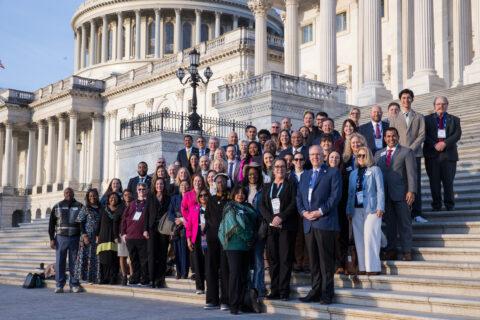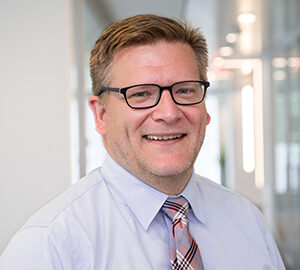In recognition of Economic Mobility & Opportunity month, NLC has launched a showcase series for select case studies in Results for America’s Economic Mobility Catalog. For the first in this series, we showcase the work done by Lansing, Michigan, to create an environment that prioritizes the expansion of financial empowerment for all its residents. To learn more about the catalog and this case study in particular, check out the full story here.
City Name: Lansing, Michigan
Population: 122,644
Region: Midwest
Partner: City of Lansing Office of Financial Empowerment, BOLD Lansing
Problem: After examining the spectrum of BOLD Lansing partnerships, City of Lansing Office of Financial Empowerment (OFE) staffers noted a lack of awareness and partnership gaps in their engagements and program uptake with Lansing School District students and their families.
Solution: Using funds from NLC’s 2024 Advancing Economic Mobility Rapid Grant program, the City of Lansing officials utilized a part-time BOLD Lansing navigator to launch a series of events targeting students and their families and strengthen partnerships amongst BOLD Lansing partners and other stakeholders.
Outcome: The City of Lansing saw an uptake in engagement with BOLD Lansing programs with one local high school reporting an increase in Lansing SAVE participation from 9% to 18% and an average student account balance increase of 13% in less than a year.
EXPLORE THIS CITIES IN ACTION RESOURCE
Background
After the Great Recession in 2008, the City of Lansing, MI, was at a crossroads: many of its residents were experiencing significant financial challenges, such as a six-percent spike in unemployment. To combat these challenges, the City of Lansing secured a three-year, $1.5 million grant from the Cities for Financial Empowerment (CFE) Fund in 2013. Using this grant, the city was able to launch the Office of Financial Empowerment (OFE) to implement the CFE Fund’s Financial Empowerment Center model.
Through the creation of the Financial Empowerment Center (FEC), Lansing residents can receive free one-on-one financial counseling from trained staff. In addition, participants can receive connections to programmatic services from other community partners. From 2015 to 2025, OFE helped reduce $13.8 million of debt with an additional $1.2 million put into savings for over 5,500 residents. Through this continued success, OFE housed three more financial empowerment programs in their portfolio:
- Lansing SAVE, the children’s saving account program for K-10th grade students in the Lansing School District that helps students save for college or vocational school expenses;
- BankOn, the program to help residents access safe and affordable financial products and services; and
- OS Reentry, a program designed to help reduce recidivism and increase public safety by offering wraparound supports to returning citizens.
To ensure a continuum of support for students in particular, the City of Lansing launched BOLD Lansing in 2019. BOLD Lansing served as a coalition that included the City of Lansing, Lansing School District, MSU Federal Credit Union (MSUFCU), the Lansing Promise, Capital Area College Access Network, and MiPath. This continuum takes a Lansing resident’s hand at kindergarten enrollment and holds it into retirement, through financial education, FAFSA assistance, college visits, scholarship dollars, and financial counseling. This continuum of services through the different institutional stakeholders above creates a system of service that allows each organization to provide specialized services based on their expertise and scope.
Problem
Despite the plethora of different services targeting students and their families, engagement and awareness gaps existed throughout the BOLD Lansing spectrum. For example, Lansing SAVE is the children’s savings account program that helps students pay for college; the combination with Lansing Promise’s college scholarship program is a natural fit for Lansing students. Yet, according to data collected from OFE, only one in six Lansing Promise Pathfinders embedded in Lansing High Schools knew about Lansing SAVE. This lack of awareness of the suite of BOLD Lansing programs extended into the classrooms, with 29 percent of students and 35 percent of teachers surveyed saying they had not heard of Lansing SAVE.
Solution
Utilizing funds from NLC’s 2024 Advancing Economic Mobility Rapid Grant program, the City of Lansing launched a renewed effort to break down silos and improve communications across the entire continuum of BOLD Lansing organizational stakeholders. As part of this effort, OFE brought in a former Lansing School District teacher to spearhead the work of convening partners, promoting BOLD Lansing, and reaching more students in the school district. Leveraging the learned experience of their staff and existing relationships within the school district, BOLD Lansing expanded their reach throughout the Lansing School District.
Outcome
According to OFE data, throughout the eight months of their NLC Rapid Grant engagement, OFE participated in more 40 BOLD partnership events with more than 2,000 students, parents and other community members in attendance. These events included Lansing SAVE Night, classroom presentations for 9th and 10th graders, FAFSA Nights, parent-teacher conferences and career readiness training. BOLD Lansing staff also hired its first youth navigator for a pilot program at Everett High School. The impact was measurable. Based on OFE data, Everett’s Lansing SAVE participation rate doubled from 9 percent to 18 percent, and average student account balances increased by 13 percent in less than a year. These are early but clear indicators that student engagement, combined with a strong, community-based partnership approach, is driving progress.
Beyond external events and engagements, the expanded BOLD partnership effort increased efficiency within the continuum of the program providers. According to interviews with OFE staff, all BOLD Lansing partners agreed to share data with the Lansing School District as the central hub. Through this coordination, BOLD partners can make more connections and improve service delivery for students as they navigate the suite of programs.
For BOLD Lansing and their network of partners, the “one-stop shop” approach enables youth and their families to get the tools, resources, and training they need, regardless of their entry point. The OFE team presented their BOLD Partnership at a Cities for Financial Empowerment Fund coalition meeting with several attendees interested in replicating the partnership for their communities. For the OFE team, this program only marks the beginning of a new and revamped BOLD Lansing partnership. “We used this grant to fund a part time BOLD Navigator, who could not only identify the silos and gaps in our work but could address them immediately,” said OFE Director Amber Paxton. “This had a tremendous effect on community trust as well as awareness, increasing take-up, engagement, and efficiency of our services and our coalition.”









